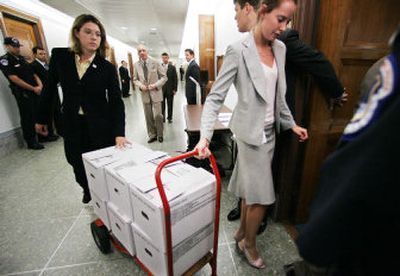Democrats study Roberts’ papers

WASHINGTON – Frustrated Senate Democrats struggled to unearth Supreme Court nominee John Roberts’ elusive views on abortion, civil rights and other issues Tuesday, digging through newly released government documents while criticizing the White House for refusing access to thousands more.
“It’s more than what they need,” President Bush’s spokesman said of the material being turned over.
The disagreement over access to decades-old government records flared as Attorney General Alberto Gonzales suggested that, if confirmed, Roberts would not be bound by an earlier statement that the landmark 1973 ruling that established a woman’s right to an abortion was settled law.
Gonzales said that “a Supreme Court justice is not obliged to follow precedent if you believe it’s wrong.”
One week after Bush nominated Roberts to succeed Sandra Day O’Connor on the high court, the 50-year-old appeals court judge seemed to float above the fray as he continued courtesy calls on senators.
At the same time, Senate Republicans and the White House worked in tandem to try to assure a confirmation vote in time for him to don the robes of a justice before the court begins a new term. “Our duty is to have a justice seated by the first Monday in October,” said Sen. Arlen Specter, R-Pa., chairman of the Judiciary Committee.
Specter said he would convene hearings as early as Aug. 29 if necessary to meet that timetable.
Democratic leader Harry Reid of Nevada said he saw no need to rush. “I think the key to all this is to make sure that there’s ample time for the committee to do its work.”
Vermont Sen. Patrick Leahy, senior Democrat on the Judiciary Committee, said he wanted to cooperate with the GOP, “but moving forward on a schedule will also require the White House’s cooperation with senators in answering their questions about this nomination.”
That seemed to be a reference to documents the White House has declared off limits, and Leahy and other Democrats on the panel underscored their point by writing Bush that they were “disappointed” in the action.
The politicians jockeyed for position as committee aides began sifting through the first of thousands of documents to be made available, dating from Roberts’ tenure as a special assistant in the Justice Department from 1981 to 1982, and in the White House counsel’s office from 1983 to 1986.
As a historical footnote, one memo was hard to beat – a one-page paper in which the young Roberts reported that beginning “my first day on the job” he had been helping O’Connor prepare for her own confirmation hearings to the high court.
He posed questions to her in two practice sessions, he wrote. And in a sentence that could apply to his own confirmation proceedings, Roberts wrote on Sept. 17, 1981, “The approach was to avoid giving specific responses to any direct questions on legal issues likely to come before the court, but demonstrating in the response a firm command of the subject area and awareness of the relevant precedents and arguments.”
A document dated Feb. 16, 1982, showed Roberts offering advice for Attorney General William French Smith, who was girding for an appearance before conservatives unhappy with the direction the Justice Department was taking early in the Reagan administration.
Addressing criticism that judicial nominations weren’t “ideologically committed to the president’s policies,” Roberts suggested something other than a “yes they are” answer. “Rather, we should shift the debate and briefly touch on our judicial restraint themes,” he wrote. “It really should not matter what the personal ideology of our appointees may be, so long as they recognize that their ideology should have no role in the decisional process.”
It is a point that the Bush administration makes in the current case – that regardless of Roberts’ personal political views, he will rule based on the Constitution and court precedent.
It is also a point that Democrats find maddening – particularly since Roberts has left a relatively small paper trail that might confirm suspicions they have that he will attempt to move the court to the right.
Democrats said other documents already in their possession, dating from Roberts’ time in the White House counsel’s office later in the Reagan administration, give them reason for concern.
In one, relating to calls for expanded protection under housing discrimination law, Roberts wrote then-White House counsel Fred Fielding that he didn’t believe “there is a need to concede all or many of the controversial points … to preclude political damage.”